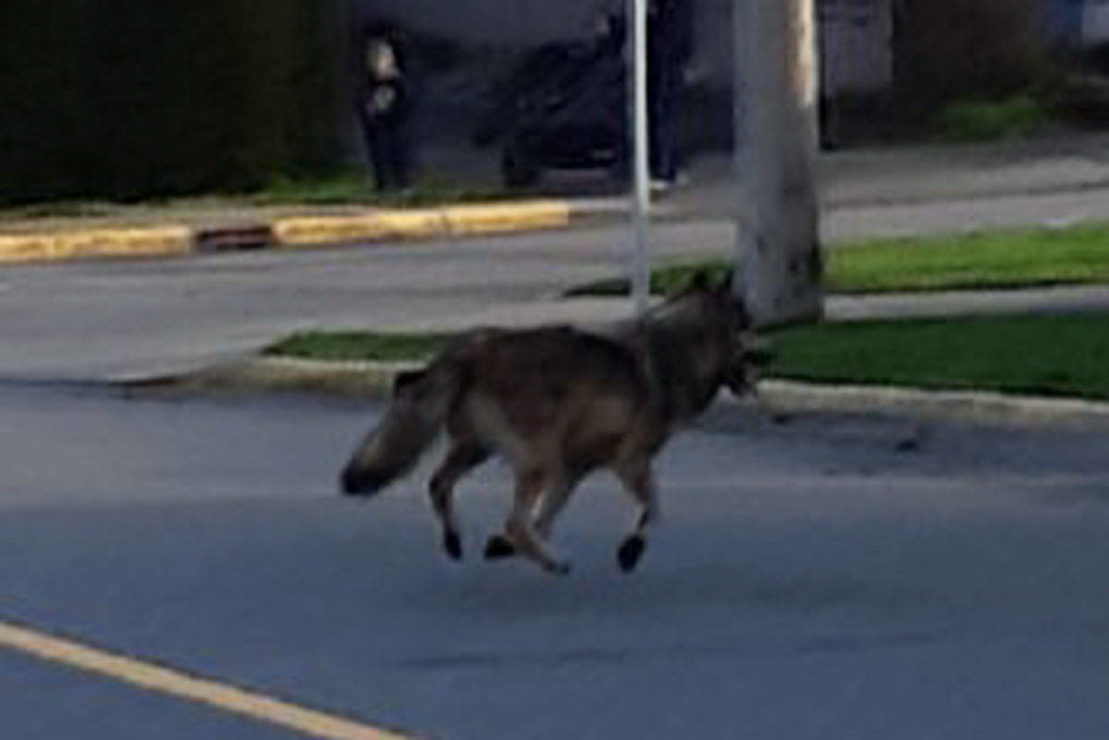Takaya lived on an island just off of Oak Bay for eight years, before venturing into James Bay in January

When Cheryl Alexander first heard there was a wolf roaming around James Bay on a weekend in late January, she didn’t think it was Takaya — the wolf made famous for living alone on Discovery Island off the coast of Oak Bay for eight years.
She wondered if it was the female wolf spotted in 10 Mile Point a few months ago, or another dispersing wolf entirely. It wasn’t until she saw photos and recognized the wolf’s markings that she thought it was Takaya.
“I was there when he was captured. It was super emotional, understanding that it was Takaya, and understanding what must be happening for him, just the feeling of terror he must be feeling,” says Alexander.
Takaya fled Discovery Island on Jan. 25, and was tranquilized one day later by the B.C. Conservation Officer Service in a residential area on Jan. 26. After being taken to a provincial veterinarian in Nanaimo, the officers determined Takaya was healthy enough to be released and sent him back into the wild in an area on the west coast of Vancouver Island.
It remains unknown whether Takaya will ever return to Discovery Island.
Alexander developed a unique bond with Takaya over the eight years he lived on the island. As an environmental and conservation photographer, Alexander frequently used her boat to visit the wolf. Last year, Alexander documented Takaya’s survival on the island in a feature-length documentary for CBC’s The Nature of Things.
“I started to observe him, and I began to realize that there was nothing about it that made me fearful. He gave no indication of being aggressive, or even caring about my presence — he got comfortable with it,” said Alexander.
Among Takaya’s unique survival instincts, Alexander filmed the wolf digging for moisture in the summer months when ponds dried up, snatching goose eggs one by one, and avoiding multiple traps from the park authorities.
“My kids would say, ‘don’t get too close!’ I recognize he’s a wild animal, but I’m sensitive to the fact there isn’t a lot to fear from him,” she said. “For the most part he will avoid people and get within a certain distance [of them] so what happened in James Bay was quite unusual.”
While Takaya was never aggressive to humans or pets, Alexander believes Takaya was scared and originally fled the island due to hunger. Specifically, she says, this year Victoria has been hit with a huge number of storms, and coupled with high winter tides, many seals haven’t been able to access the island — leaving Takaya with fewer animals to hunt.
Alexander remains thankful that the conservation officers didn’t shoot Takaya when he was spotted in James Bay in January, which is currently the protocol for large carnivores.
“It was very emotional for me. You know how close people get to their dogs, while he wasn’t my pet, but I have spent a lot of time with him — probably more time anyone spends with their pets. It’s like having a member of your family have this trauma happen to them,” she says.
“The good part is that they didn’t shoot him, which the standard policy in B.C. right now is to kill rather than capture and relocate.”
She suspects that is due to Takaya’s large star presence and following from the documentary, and various news articles highlighting the wolf’s survival and coexistence with humans on Discovery Island for nearly a decade.
Since airing the documentary last October, which also aired on BBC4 in the United Kingdom, Alexander says she has heard from people from across Canada, Australia, and the world who have been inspired by Takaya’s story.
For people who have never heard about Takaya prior to the weekend in January, and may not know his story, Alexander says she would tell them he is an inspiration and perfect illustration of learning to adapt and survive in an environment is close proximity to humans.
“He should be an inspiration to us for coexistence,” she said. “We, as humans, were able to work our way through to leaving him there for those eight years and allowing him to survive close to us. Whereas often what we do with wild animals that come anywhere near us, we just kill them.”
Alexander says Takaya will have to contend with trappers, hunters, and other animals to survive in his new location in western Vancouver Island — which he didn’t have to deal with while living alone on the island.
Despite Takaya being relocated hundreds of kilometres away from the home he formed on Discovery Island, Alexander says wolves have an amazing ability to travel long distances and wouldn’t rule out a chance Takaya returns one day.
“I would not be surprised if I go out to the islands one day and see him up on the bluff,” she said.
Cheryl Alexander is scheduled to publish the book, Takaya, with Rocky Mountain Books in the fall of 2020. For more information about the book and Takaya, you can visit Cheryl’s Instagram page @cher_wildawake







